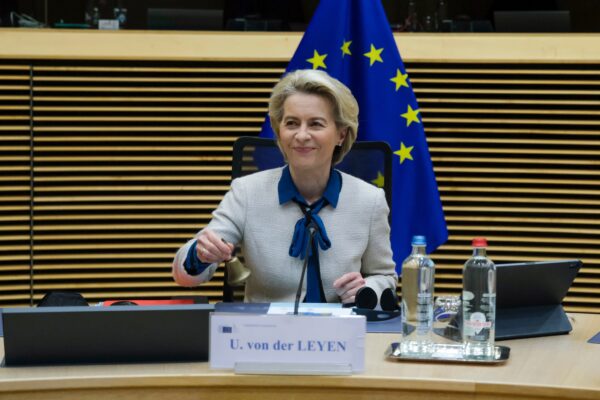This website uses cookies so that we can provide you with the best user experience possible. Cookie information is stored in your browser and performs functions such as recognising you when you return to our website and helping our team to understand which sections of the website you find most interesting and useful.

On 23 February, the European Commission is set to publish a draft law that would effectively hold companies to account for their role in human rights abuse and environmental harm.
Too many companies are profiting from exploitation, yet only 16% carry out checks on human rights and environmental impacts across their whole value chain. In Côte D’Ivoire and Ghana, 30,000 children and adults work in forced labour on cocoa plantations. The Uyghur Region produces almost 20% of the world’s cotton — one in five cotton products sold globally, including those sold across the EU, could be tainted with forced labour. Palm oil is responsible for 1.4% of global greenhouse gas emissions — almost as much as the aviation sector. In China’s toy industry, workers are made to work 11-hour shifts without rest breaks. In 2020, Global Witness recorded 227 fatal attacks on environmental defenders, 70% of whom were working to protect forests from destruction, and 30% were linked to resource exploitation in logging, mining, agribusiness, and infrastructure.
Lawsuits against European companies rarely end in accountability due to serious legal hurdles in bringing cases, reveals a recent ECCJ report. Claimants won in only two civil cases — both against Royal Dutch Shell — and no final judgment has ordered compensation for damages outside of Europe.

Pressure from EU Parliament and civil society
The publication of the draft law comes on the back of pressure from the European Parliament, NGOs, trade unions and the public.
From December 2020 to February 2021, the European Commission ran a public consultation on how to design new corporate due diligence rules. Over half a million people demanded an ambitious EU law requiring all companies to identify, prevent and address their human rights and environmental risks across their entire value chain. Respondents agreed that victims of corporate abuse must be able to seek justice through civil suits before EU courts.
According to a recent YouGov poll, over 80% of Europeans from across multiple EU countries want strong laws to hold companies liable for overseas human rights and environmental violations.
These same demands were backed by the European Parliament in its report in March 2021.

Push-back from conservative industry groups
A recent report by the Corporate Europe Observatory, Friends of the Earth Europe and ECCJ shows that some business associations have mobilised to weaken or stop any law that would make them responsible for abuses.
The French business lobbies AFEP and MEDEF are lobbying heavily to water down the ambition of the EU directive. Some of their members like Total Energies and Casino Group are currently being tried for alleged corporate abuse in their supply chains under the French law. The German business lobby is also mobilising, having already substantially weakened the German supply chain act.
There is also a significant number of European businesses that are publicly supporting due diligence regulation — and some of them are arguing for more robust versions of the legislation.
How to measure if the new EU law will protect human rights and the environment?
- COVERS THE WHOLE VALUE CHAIN: The most serious human rights and environmental abuses often occur on the lowest tiers of the value chain — in countries with less stringent rules, little state support and high levels of poverty. These conditions can foster human rights abuses like forced and child labour.
- COVERS ALL COMPANIES: Bigger companies tend to cause more damage, but that is not always the case. In the garment sector, many European SMEs are still connected to global value chains. The Commission’s proposal must also cover all economic sectors.
- PROVIDES ACCESS TO JUSTICE: People must be able to pursue justice if a corporation’s activity violates their human rights or local environment. It is essential that the EU makes sure businesses do not hide evidence; provides reasonable time limits to bring cases; and allows for a large number of claimants to seek compensation collectively.
- BUSINESSES ARE HELD LIABLE: Companies based or operating in the EU that cause, contribute, or are linked to human rights or environmental abuses must be held legally responsible via civil liability (to grant compensation to victims) and administrative liability (for a failure to undertake due diligence to prevent harm from occurring).
- LAW HAS TEETH: We need an effective law that enforces companies’ obligations and sanctions non-compliance.
- AFFECTED WORKERS AND COMMUNITIES ARE INCLUDED: Trade unions, affected communities, women’s groups, indigenous communities and other relevant parties must be able to provide input on risks and impacts.
Next steps
Publication of the Commission’s proposal will kick off rounds of negotiations both in the European Parliament and among national ministers.
Press kit
The press kit “Unpacking the upcoming EU law to stop corporate abuse” is available in English, French, German, Spanish and Slovenian.
Contact
ECCJ Director Claudia Saller is available in Brussels for interviews in English, German and French.
Alejandro García Esteban, ECCJ Policy Officer: alejandro.garcia@corporatejustice.org
Iva Petkovic, ECCJ Communications Officer: iva.petkovic@corporatejustice.org
European Coalition for Corporate Justice (ECCJ) is the largest civil society network devoted to corporate accountability in the EU. We draw on the expertise and experience of organisations across Europe and provide a united voice. Representing over 480 organisations from 17 countries, we are the only European coalition bringing together civil society, trade unions, consumer organisations and academics.
Read more on our website and follow us on Twitter and LinkedIn.
ECCJ’s identification number in the Transparency Register is: 48872621093-60












